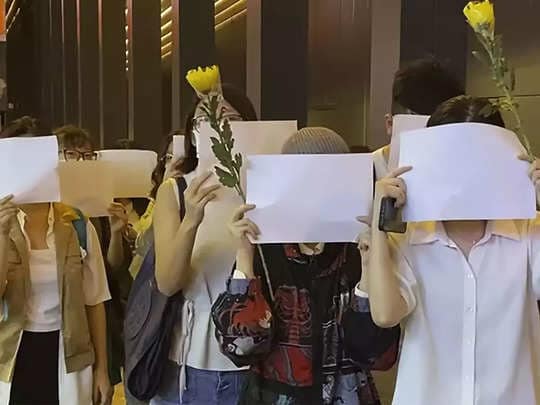The Last Straw in China
"Get rid of the strict lockdown," screamed protesters in cities across China. In Shanghai and Beijing, people raised blank pages in the air. Xiao Qiang, a researcher on internet freedom at the University of California, Berkeley, explained what that means: "People know what they want to express, and so do the authorities, so people don't need to say anything. If you have a blank page, everyone will know what you mean.”
Some demonstrators called on the Communist Party and its leader, Xi Jinpeng, to resign! It is clear that people are tired of his brutal approach to COVID-19, while still using the strict lockdown anywhere people contract COVID.
Outside of China, the rest of the world has moved on to a new stage, where everything is open and there are no barriers to people moving from place to place. That approach depends on effective vaccines, like those offered by Pfizer and Moderna, being available to people. Thousands of people from all over the world have come together in Qatar supporting their national soccer teams, in full stadiums – with no masks and no problems!
China's approach was praised at the start of the pandemic, and there is no doubt that it saved lives. But almost three years later, there are more contagious versions of COVID, which spread much more easily than before. The once effective approach is now outdated and ineffective. People are demanding more freedom again, but the Communist Party is not listening to them. Usually, Chinese people are reluctant to say or do anything, because they are afraid of what might happen to them there. But now, demonstrations are happening frequently. What is going on in China?
Lockdown after lockdown
The strict lockdown policy regarding the virus has been in place since the beginning of the pandemic. No other country has such a difficult policy in place anymore, and it is clear that the benefit is not worth the trouble. Often, people have to stay at home for three or four months, and when there is a strict lockdown in a big city, there are many problems. We saw that when the government put 25 million people under strict lockdown in Shanghai last summer. The local economy was badly damaged, and there was a shortage of food and services in the city. As a result, there was a confrontation between the residents and the authorities - something that rarely happens in China.
An Economy in Trouble
China's economy is suffering badly due to the government's policy regarding COVID. That affects businesses, big and small, from the local shops and restaurants up to the manufacturing companies of the iPhone, like Foxconn. The production of the iPhone was reduced, when many Foxconn employees had to stay at home. Therefore, Apple had to warn that sales of the iPhone would fall.
According to the latest data, China's economy recently grew by 3.9 percent and some economists are predicting that rate will fall even more before the end of the year. Growth was on track for around 5.5 percent this year in China!
The Last Straw!
On November 24, ten people were burned to death at home in an apartment block in Urumqi in China's Xinjiang province. This is a region of 25 million people that was under strict lockdown for more than three months. (The region has previously been in the news for the harsh treatment of the Uighur Muslims who live there.)
Many Chinese think that the ten died as a result of the lockdown in place in Urumqi. At the beginning of the lockdown, barriers were erected to keep people at home. During the fire, people were unable to escape from the block of flats, and the emergency forces were greatly delayed, due to the same barriers being in the way.
That was the fatal blow, and then the protests really started, and they quickly spread all over the country. I hope that the government will listen to the demonstrators, and then change their approach to the virus.
Unfortunately, if history is any indication, there is little hope that the right thing will be done!






